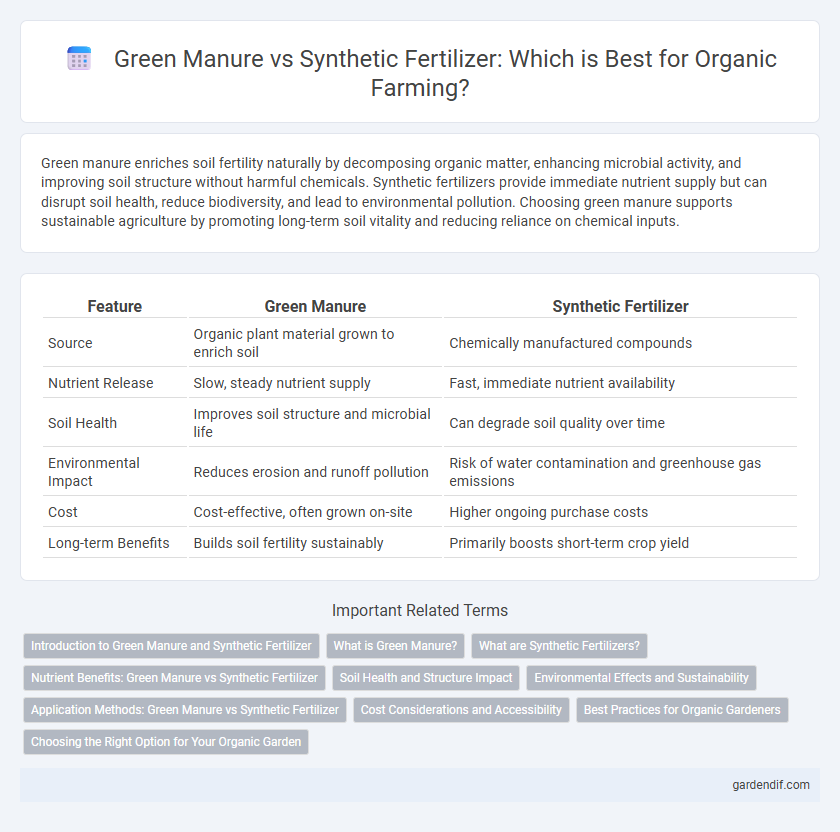
Green Manure vs Synthetic Fertilizer Illustration
Green manure enriches soil fertility naturally by decomposing organic matter, enhancing microbial activity, and improving soil structure without harmful chemicals. Synthetic fertilizers provide immediate nutrient supply but can disrupt soil health, reduce biodiversity, and lead to environmental pollution. Choosing green manure supports sustainable agriculture by promoting long-term soil vitality and reducing reliance on chemical inputs.
Table of Comparison
| Feature | Green Manure | Synthetic Fertilizer |
|---|---|---|
| Source | Organic plant material grown to enrich soil | Chemically manufactured compounds |
| Nutrient Release | Slow, steady nutrient supply | Fast, immediate nutrient availability |
| Soil Health | Improves soil structure and microbial life | Can degrade soil quality over time |
| Environmental Impact | Reduces erosion and runoff pollution | Risk of water contamination and greenhouse gas emissions |
| Cost | Cost-effective, often grown on-site | Higher ongoing purchase costs |
| Long-term Benefits | Builds soil fertility sustainably | Primarily boosts short-term crop yield |
Introduction to Green Manure and Synthetic Fertilizer
Green manure consists of specific plants grown to enhance soil fertility by fixing nitrogen and improving organic matter content, promoting sustainable agricultural practices. Synthetic fertilizers are chemically manufactured substances designed to provide concentrated nutrients such as nitrogen, phosphorus, and potassium for rapid crop growth. The choice between green manure and synthetic fertilizers influences soil health, nutrient cycling, and long-term farm productivity.
What is Green Manure?
Green manure consists of specific plants grown to improve soil fertility by adding organic matter and essential nutrients like nitrogen through natural processes. Unlike synthetic fertilizers, green manure enhances soil structure, promotes microbial activity, and reduces erosion without chemical residues. Common green manure crops include legumes such as clover, alfalfa, and vetch, which fix atmospheric nitrogen and enrich the soil for subsequent crops.
What are Synthetic Fertilizers?
Synthetic fertilizers are chemically manufactured substances designed to supply essential nutrients like nitrogen, phosphorus, and potassium to plants, promoting rapid growth and higher yields. These fertilizers are produced through industrial processes, often involving the Haber-Bosch method to synthesize ammonia for nitrogen content. Unlike organic alternatives, synthetic fertilizers typically lack organic matter and can lead to soil degradation and environmental pollution if overused.
Nutrient Benefits: Green Manure vs Synthetic Fertilizer
Green manure enhances soil fertility by naturally fixing nitrogen and improving organic matter content, promoting long-term nutrient cycling and soil health. Synthetic fertilizers provide immediate nutrient availability with precise formulations of nitrogen, phosphorus, and potassium, but lack the soil-building benefits of organic matter. Using green manure supports sustainable nutrient release, whereas synthetic fertilizers deliver rapid nutrient uptake but may lead to soil degradation over time.
Soil Health and Structure Impact
Green manure improves soil health by enhancing microbial activity, increasing organic matter, and promoting better soil structure through root biomass decomposition. Synthetic fertilizers, while providing immediate nutrient availability, often lead to soil acidification and reduced microbial diversity, which degrade soil structure over time. Incorporating green manure supports long-term fertility and soil resilience, contrasting with the short-term gains and potential soil degradation linked to synthetic fertilizer use.
Environmental Effects and Sustainability
Green manure significantly enhances soil health by increasing organic matter and promoting biodiversity, which reduces erosion and improves water retention, making it a sustainable choice for long-term agriculture. Synthetic fertilizers, while providing immediate nutrient availability, often lead to soil degradation, water pollution from runoff, and greenhouse gas emissions that contribute to environmental harm. Transitioning to green manure supports ecosystem balance and reduces dependency on fossil-fuel-based inputs, fostering more resilient and eco-friendly farming systems.
Application Methods: Green Manure vs Synthetic Fertilizer
Green manure is applied by growing specific cover crops such as clover or legumes, which are later plowed into the soil to enrich it with organic matter and nitrogen. Synthetic fertilizers are typically applied directly to the soil or foliage in measured doses, delivering concentrated nutrients for immediate plant uptake. The green manure method improves soil structure and microbial activity, while synthetic fertilizers provide targeted nutrient availability for rapid growth.
Cost Considerations and Accessibility
Green manure offers a cost-effective alternative to synthetic fertilizers by utilizing locally available plant materials that reduce the need for expensive chemical inputs. Synthetic fertilizers often involve higher upfront costs and ongoing expenses, limiting accessibility for small-scale or resource-poor farmers. The long-term soil health benefits of green manure can enhance productivity while minimizing financial investment in external inputs.
Best Practices for Organic Gardeners
Green manure enriches soil fertility by incorporating nitrogen-fixing plants like clover or legumes, which improve soil structure and promote beneficial microbial activity essential for organic gardening. In contrast, synthetic fertilizers offer rapid nutrient availability but may disrupt soil ecology and lead to nutrient imbalances over time. Organic gardeners should prioritize green manure applications to maintain sustainable soil health, enhance moisture retention, and reduce dependency on chemical inputs.
Choosing the Right Option for Your Organic Garden
Green manure enhances soil fertility by adding organic matter and promoting beneficial microbial activity, making it ideal for sustainable organic gardens. Synthetic fertilizers provide immediate nutrient availability but may disrupt soil ecosystems and lead to chemical buildup over time. Choosing green manure supports long-term soil health and aligns with organic gardening principles, ensuring consistent plant growth without compromising environmental integrity.
Green Manure vs Synthetic Fertilizer Infographic

 gardendif.com
gardendif.com